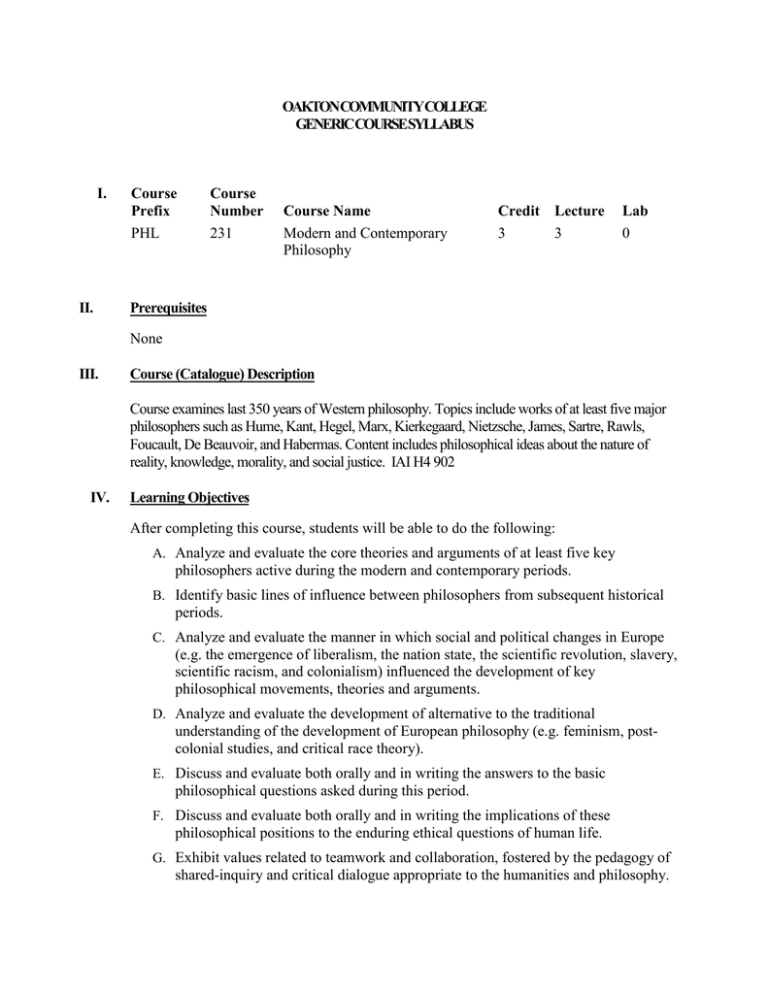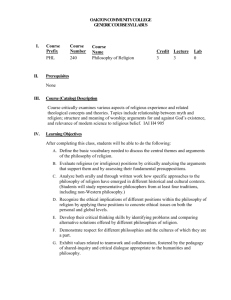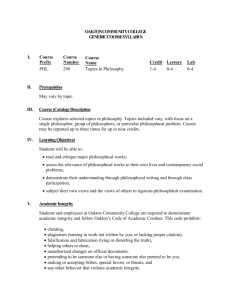
OAKTONCOMMUNITYCOLLEGE
GENERICCOURSESYLLABUS
I.
II.
Course
Prefix
PHL
Course
Number
231
Course Name
Modern and Contemporary
Philosophy
Credit Lecture
3
3
Lab
0
Prerequisites
None
III.
Course (Catalogue) Description
Course examines last 350 years of Western philosophy. Topics include works of at least five major
philosophers such as Hume, Kant, Hegel, Marx, Kierkegaard, Nietzsche, James, Sartre, Rawls,
Foucault, De Beauvoir, and Habermas. Content includes philosophical ideas about the nature of
reality, knowledge, morality, and social justice. IAI H4 902
IV.
Learning Objectives
After completing this course, students will be able to do the following:
A. Analyze and evaluate the core theories and arguments of at least five key
philosophers active during the modern and contemporary periods.
B. Identify basic lines of influence between philosophers from subsequent historical
periods.
C. Analyze and evaluate the manner in which social and political changes in Europe
(e.g. the emergence of liberalism, the nation state, the scientific revolution, slavery,
scientific racism, and colonialism) influenced the development of key
philosophical movements, theories and arguments.
D. Analyze and evaluate the development of alternative to the traditional
understanding of the development of European philosophy (e.g. feminism, postcolonial studies, and critical race theory).
E. Discuss and evaluate both orally and in writing the answers to the basic
philosophical questions asked during this period.
F. Discuss and evaluate both orally and in writing the implications of these
philosophical positions to the enduring ethical questions of human life.
G. Exhibit values related to teamwork and collaboration, fostered by the pedagogy of
shared-inquiry and critical dialogue appropriate to the humanities and philosophy.
COURSE SYLLABUS (GENERIC)
Page 2
PHL 231
V.
Academic Integrity
Students and employees at Oakton Community College are required to demonstrate
academic integrity and follow Oakton’s Code of Academic Conduct. This code prohibits:
cheating,
plagiarism (turning in work not written by you, or lacking proper citation),
falsification and fabrication (lying or distorting the truth),
helping others to cheat,
unauthorized changes on official documents,
pretending to be someone else or having someone else pretend to be you,
making or accepting bribes, special favors, or threats, and
any other behavior that violates academic integrity.
There are serious consequences to violations of the academic integrity policy. Oakton’s
policies and procedures provide students a fair hearing if a complaint is made against
you. If you are found to have violated the policy, the minimum penalty is failure on the
assignment and, a disciplinary record will be established and kept on file in the office of
the Vice President for Student Affairs for a period of 3 years.
Details of the Code of Academic Conduct can be found in the Student Handbook.
VI.
Outline of Topics
(Below is a sample of possible topic areas for the course. Instructors may take an
historical survey approach, a thematic approach, or combine the two in some fashion.)
A. Philosophy & the Scientific Revolution
B. Rationalism, Empiricism, and Idealism
C. Philosophy and Politics: Liberalism and its Discontents
D. Kierkegaard and Nietzsche’s Challenge to the Claims of Reason
E. Mill’s New Empiricism and the Development of Modern Philosophy of Science
F. Race and Philosophy
G. 20th Century Existentialism and the Crisis of Meaning
H. The Alternative Path of Anglo-American Analytic Philosophy
I. Simone de Beauvoir and the Development of Feminist Philosophy
J. Foucault’s Postmodernism and New Directions for Western Philosophy
COURSE SYLLABUS (GENERIC)
Page 3
PHL 231
VII. Methods of Instruction
A. Lectures and discussion
B. Small group work
C. Films
D. Student presentations and debates
E. Guest speakers
F. Field trips may be required
VIII.
Course Practices Required
(Please include information here about all expectations you have for your students
regarding behavior, work, etc. The following are sample topics you may wish to cover.
Please be aware that you must require students in this course to produce at least 15 pages
of critical written assignments over the course of the semester. These may be assigned in
a variety of ways including journals, response papers, field trip projects, etc.)
A. Attendance
B. Standards for written work
C. Quizzes/Exams
D. Participation
E. Essays
F. Final Project
G. Special policies about make-up exams, late papers, or other matters of concern
IX.
Instructional Materials
Instructors may choose to use several short works in their entirety such as Nietzsche’s
Thus Spoke Zarathustra, Descartes’ Meditations, Hume’s Three Dialogues on Natural
Religion, Mill’s On Liberty, Simone de Beavoir’s The Second Sex (selections), Marx’s
Economic and Philosophic Manuscripts of 1844, Kant’s Prolegomena To Any Future
Metaphysics, and West’s Race Matters.
Another possibility is using a fairly comprehensive anthology of primary sources such as
Baird and Kaufmann’s Philosophic Classics, Volumes III and IV.
COURSE SYLLABUS (GENERIC)
Page 4
PHL 231
X. Methods of Evaluating Student Progress
(In this section, please present the percentages or point breakdown of their final grade.
The writing assignments should count for at least 40% of the final grade. An example
follows.)
A. Quizzes/Exams……40 points
A. Essays……40 points
B. Final project with oral presentation……10 points
C. Attendance and participation………10 points
D. Grading scale: 90-100, A…….80-89, B………70-79, C……….60-69……..D
XI.
Other Course Information:
A. Disabilities
If you have a documented learning, psychological, or physical disability you may be
entitled to reasonable academic accommodations or services. To request accommodations
or services, contact the ASSIST office in the Learning Center. All students are expected to
fulfill essential course requirements. The College will not waive any essential skill or
requirement of a course or degree program.
B. Discrimination
The Oakton Community College Catalog states:
Oakton Community College does not discriminate on the basis of race, color, creed,
religion, national origin, disability, age, sex, sexual orientation, or marital status in
admission to and participation in its educational programs, activities and services, or
employment practices. The College does not tolerate sexual harassment or sexual
assault by or of its students or employees.
In keeping with this policy of tolerance and non-discrimination, in this class all of us
(myself included) should strive to listen and give careful consideration to all ideas
expressed in class, especially those that are different from our own, without attacking or
demeaning the people who have those views. We should also strive to avoid using
insulting terms or telling offensive jokes when talking to or about individuals or groups.
C. Instructor information
Office number and office hours:
Phone number:
Email and website:
COURSE SYLLABUS (GENERIC)
Page 5
PHL 231
Effective beginning term:
Fall 2010
Ending term:
Syllabus prepared by: Hollace Graff
Date: March 2006
Revised by:
Date: June 2010
Tom Bowen
Reviewed by Chair:
Hollace Graff
Date: July 2010
Approval by Dean:
Linda Korbel
Date
August 2010




